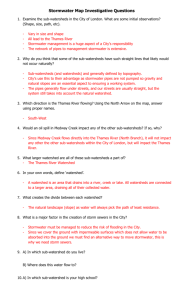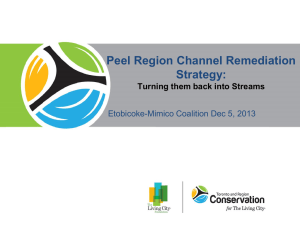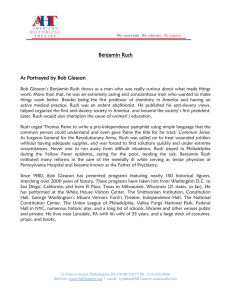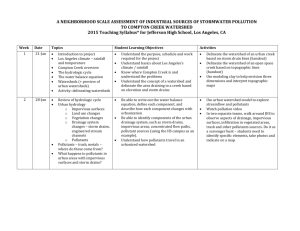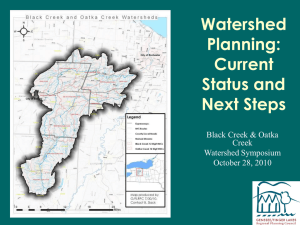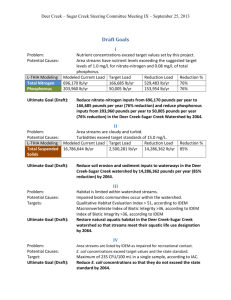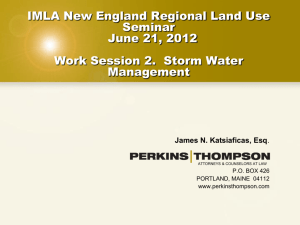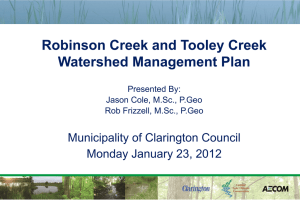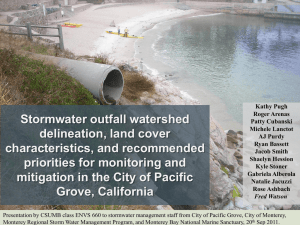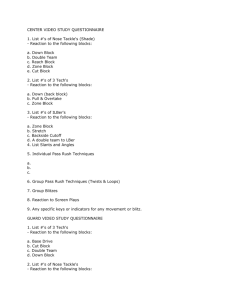Creeks Gone Wild - The Association of State Floodplain Managers
advertisement
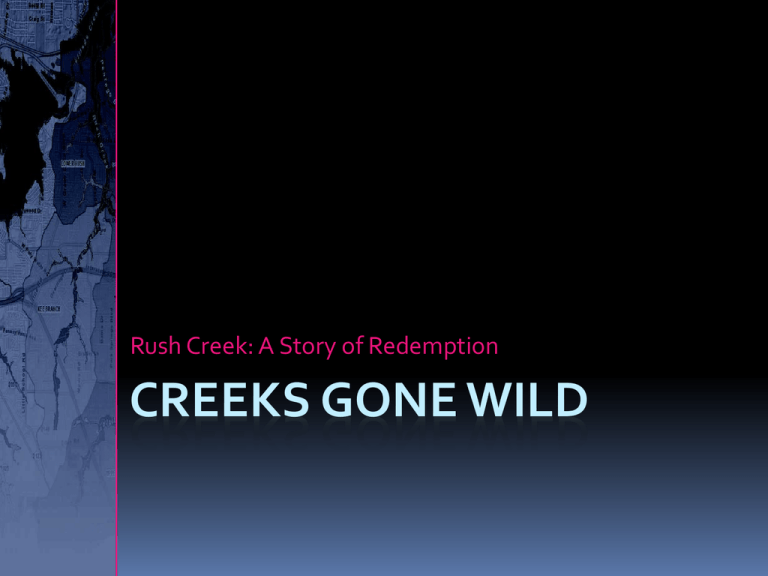
Rush Creek: A Story of Redemption CREEKS GONE WILD Arlington Stormwater Division Stormwater Division of Public Works is: Engineers Education Environmental Compliance Officers Operations and Maintenance Stormwater Utility Fee Based on impervious area Funding raised from $1.30 in 2007 to $4.25 in 2010 ($3.8 million a year to $10.3) Arlington Stormwater Background Arlington Policy History Rational Method Design 5-25 year storm sewer design Detention only required if “downstream” structural flooding occurs BMPs recently required based on site size Erosion control projects only when infrastructure is threatened Past Drainage Projects Drainage projects were limited scope and highly localized Buyout projects: Johnson Creek area (140 structures in 2003) Rush Creek – Shady Valley (6 structures in 2009) Rush Creek Background Rush Creek Watershed stats ~28 square miles ~260,000 linear feet of creek ~1,500 structures in floodplain Flooding history? Rush Creek Development 1976 1962 2009 1976 September 8, 2010 – 50 Year Storm Sept 8th, 2010 Storm Damage estimates After the Storm High water marks Federal disaster declaration ??? Buyout Timeline Decision timeline Grants and federal uncertainty Previous projects and conclusions Letters, council executive sessions and waiting… To wait or not to wait COUNCIL APPROVAL and spontaneous impatience Demo Timeline appraisal / offer gas and electric water service pay people closing testing notify state demo day internal permit Securit y and mowing habitat training Lessons Learned vegetation and restoration are costly unknown costs when testing is done coincidental to demo news of vacant houses travels fast make ownership as clear as possible, stop ANYONE on site make friends with your enemies (AKA unhappy residents) write a policy before you need it (lots of reasons against it come up after a flood) what SWPPP??? make sure all departments are speaking with “one voice” be annoying with coordination What’s next Park Plan Public meetings Other buyouts Gauges Watershed Study Why bother with a watershed study Regulation of development Better CIP planning Need accurate flood risk Assessment of channel stability Watershed Disorders Watershed mixing Development-friendly environment Built-out Large number of small tributaries Unstable Undersized bridges The Plan Unsteady Hec-RAS 2D Area Hydrology Subwatershed boundaries Channel stability analysis Project Alternatives The Structure City Hydrology Consultant (Halff Associates) Project Manager (CDM-Smith) Channel Stability (Michael Baker) RC-1 & Lower Rush (Dewberry) Sub-Watershed Consultants Middle Rush (AECOM) Upper Rush & Kee Branch (Michael Baker) Project Schedule July 2011 • Project Kickoff with PMC Nov 2011 • Hydrology Kickoff Jan 2012 • Sub-Watershed Consultants Kickoff Feb 2012 • Public Meeting April 2012 • Survey Complete Oct 2012 • Models Complete Oct 2012 • Channel Stability Analysis Complete Nov 2012 • Project Alternatives Complete March 2013 • Submit Physical Map Revision to FEMA Minor Details Public meeting Technical Standards Website Memos etc. Survey Coordination Hydrology Almost 300 sub-basins ranging from 5 acres to 163 acres Submitting to FEMA in July Example Discussion: Ultimate development assumptions Assumed 75% impervious for all vacant land Time of concentration Fun Example Questions
